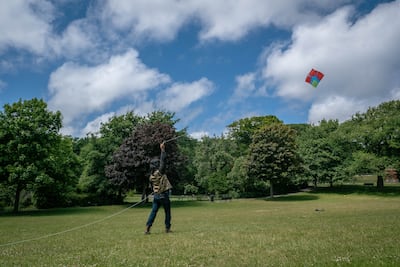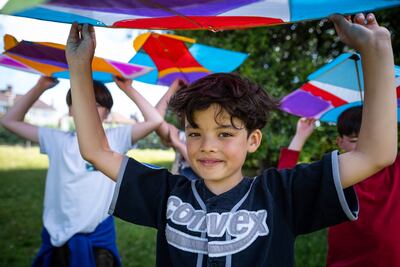Across cities in the UK and Europe, a kite flying festival to mark a year since the fall of Afghanistan to the Taliban will raise awareness over the plight of Afghans fleeing the country in an “aerial act of solidarity”.
Organised by the producers behind the epic 8,000-kilometre European journey of the giant marionette, Little Amal, the Good Chance Theatre, the Fly With Me festival will also provide an opportunity to celebrate Afghan culture.
Spread across 15 locations in the UK and Europe on August 20, the festival includes storytelling and craft-making workshops featuring the country’s 800-year-old tradition of kite-flying alongside music, poetry and dance from Afghan artists and other community groups.
Feeling Afghan culture 'between our fingers'
British-Afghan kite maker, Sanjar Qiam, who developed Fly With Me, tells The National the festival is a chance for everyone to “feel between our fingers the strings that connect us to an incredible country”.
“In all cultures we have a way of formulating relationships and bonding with each other and engaging in crafts is one of the ways in Afghanistan where people socialise,” he says from his home in Brighton, where he set up a toy shop over a decade ago.

“It's something that you do with your little brother, little sister, with your neighbour, with your friend, with your uncle. It's a collective activity, it's a form of cultural art that brings everybody together. But it's also a craft and a sport, in a way. You build something very simple and then this simple thing does the amazing thing, which is flight.”
Mr Qiam wants to spread the meaningful joy that can be found with “some bamboo sticks and some paper material” across the UK.
Fly With Me, organised by Afghanaid, will raise funds for the development organisation's By Her Side match-funding campaign to support women in rural Afghan communities.
The London edition of the festival will take place on Parliament Hill on Hampstead Heath and Mr Qiam will be there to teach people how to make and fly kites.
Life lessons from the 'magic of flight'
It’s a skill he has honed since he flew his uncle’s giant kite as a child, returning home with bloody hands from the pull of the strings.
“I was so excited but my grandmother wasn’t very happy with that.” he laughs.
Mr Qiam took his fascination to the UK when he moved there as an entrepreneur in 2011, taking 10,000 kites with him.

“I may have overestimated British enthusiasm,” he says.
He also didn’t take into account the enthusiasm of the UK’s Border Customs controllers who, while boring holes in the shipping crates to look at what was inside them, did the same with his kites.
Mr Qiam shrugs off the ruin of his merchandise, which he went on to painstakingly repair, with the same peaceful acceptance he adopts with kite-flying.
“The thing is, you can make a very good kite and it will look fantastic but it won't fly. And it's the magic of flight and you have to deal with that disappointment. You have to be gracious in dealing with frustrations,” he tells The National.
“I guess it's one of the reasons that it's so popular in Afghan culture — because it relates to things that are very in contrast, it flies but it's also very unreliable.
“There is a serendipity in flying a kite, but then we also fight the kite. It's this duality that is prominent in all aspects of our culture. There have been wars for many years but on the other hand Afghans are quite peaceful people as well.”
Mr Qiam first arrived in the UK to study for a master's degree in Scotland in 2008. He returned to Afghanistan the following year and ran his own media company in Kabul before deciding to return to England in 2011 when Nato countries first began discussing the withdrawal of troops and he felt the “writing was on the wall”.
Decades of conflict and foreign occupations have seared Afghanistan in people’s minds as a country of violence and pain. But Mr Qiam, who runs kite-making workshops across the UK, wants Fly With Me to “communicate the Afghan culture” that often gets lost in the noise of news.
However, there can be little escape from the harrowing headlines on Afghanistan, particularly about those desperately trying to escape life under Taliban rule and a devastating humanitarian crisis.
'Unfair treatment of Afghan refugees painful'
About 12,000 Afghan refugees have arrived in the UK since the fall of Kabul, but the avenues for others seeking shelter in Britain remain few and far between. Critics say the UK government is failing in its obligation to help Afghans they once worked with and have left behind.
“I think the right way to look at it is that the British government is mistreating, endangering and not protecting people who are escaping persecution, and they are perfectly capable of implementing a meaningful policy, which they have done for the Ukrainians, and we want similar programmes to be in place to protect Afghans who are running from a brutal, totalitarian regime. I think that's the message we've got to get out there,” says Mr Qiam.
While he does not want to “pit one group of victims against another” he says there is a disparity with the Government’s policy towards people fleeing Ukraine.
While British-Ukrainians can sponsor their family members to come to the UK, Mr Qiam, who is a British national, is unable to sponsor, his parents who are currently sheltering in Pakistan.
He says the government has failed to live up to its promises to help people fleeing Afghanistan.
The difference in treatment is “hurtful”, says Mr Qiam, and while he recognises there is no easy solution to the global refugee crisis “sometimes there is a simple solution to it”.
“Help create a diasporic community that is meaningful and tied to the culture and support them and that will counterbalance the Taliban, who will ultimately be just another page in history,” he says.
As he sees it, protecting Afghanistan’s bright capable minds now will ensure the country’s prosperity in the future when a post-Taliban era comes.
Two talented members of the exiled community who will be performing at the Fly With Me festival are Afghan actor, storyteller and director Elham Ehsas and Afghan musician Elaha Soroor.
While raising awareness on the plight of Afghanistan and its refugees are at the fore of the festival, Mr Qiam says the main aim of the day is “to play games and have a good time”.
“At the same time we are going to bond, say a few things, and share our joy and our pain. It’s a way to bring everybody together and to have fun,” he said.
Fly With Me takes place on August 20 in Brighton, Bradford, Dover, Folkestone, Glasgow, Liverpool, London, Manchester, Northamptonshire, Scunthorpe, Sheffield, Berlin, Pas-de-Calais, Paris and Copenhagen.

